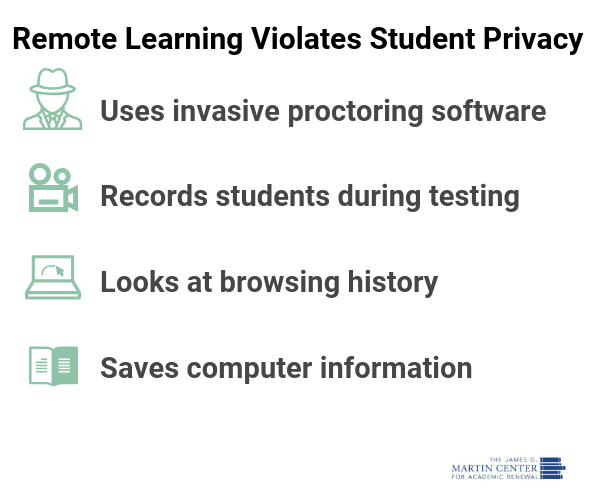As schools have moved online due to the coronavirus, they have partnered with proctoring services to monitor online exams and prevent cheating. Those services go by names such as Respondus LockDown, ProctorU, Proctorio, and Examity, among others. What gets overlooked as the contracts are signed, however, is student privacy.
Forbes compared such proctoring measures to “spyware.” Chris Dayley of Utah State University, for example, “described the software with a laugh as ‘sort of like spyware that we just legitimize” in The Washington Post. College administrators, the Post noted, defend the software because “it’s a crisis situation. Desperate times call for desperate measures.”
But do desperate times really justify breaching the privacy of millions of college students? Maintaining academic integrity is important in higher education, but the extent that these proctoring services go is beyond typical anti-cheating measures.
The Washington Post detailed the experience of a sick student at the University of Florida. She asked permission to vomit and, with no bathroom breaks permitted, remained in her seat in front of the camera, waiting to clean herself up until after she finished the test and logged off.
The invasive software that uses live proctors to “ensure test-takers abide by a strict set of rules” is the most concerning practice.
Live proctors listen to students and can require them to show their surroundings of the room to prove that no outside materials are around. Proctors can also monitor students’ facial movements and track their eyes to see where they look. If students look away from the screen for too long, the software registers this as suspicious and calculates a “suspicion” score. At the end of the exam, the students’ “academic integrity” score is sent to the professor. Poor integrity scores could result in a student failing the exam.
Rather than choosing a proctoring option that monitors students and faculty like prisoners, colleges could choose less-invasive methods.
One option for proctoring software simply prevents students from opening new tabs while taking online exams. Students retain their privacy while cheating becomes much harder. Such lockdown browsers are already used when students take online exams on campus with in-person proctors at many colleges.
The software programs colleges have used so far are extremely invasive. They also go beyond reasonable sacrifices to student privacy: As The Washington Post noted, ProctorU stated that “it shares test-takers’ browsing history, searches and online interactions with a group of website analytics providers, which it does not name.” The company also said it retains the right to share all video and audio recordings of the students with their schools to ensure “no exam protocols were violated.” Student data is retained “for as long as necessary.”
For all that, students have to pay for their privacy to be invaded at some colleges. Proctoring companies are signing contracts with universities that require fees from students.
Exams proctored through ProctorU cost $8.75 per 30 minutes, $14.75 per one-hour exam, and $21.50 per two-hour exam, and the student is billed once they schedule the exam. Refunds are only given if the exam is canceled within 48 hours before the exam time.
If students wait too long, they are charged a late fee of $12.
Not only should students’ rights be protected, but they shouldn’t have to suffer more by paying for their privacy to be breached.
Megan Zogby is a Martin Center intern.

